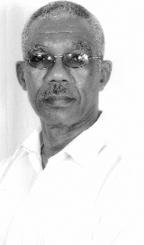The evolution of Guyana’s defence policy
(David A. Granger National Defence: A Brief History of the Guyana Defence Force 1965-2005. Georgetown, Guyana : Free Press, 2005.)
By R M Austin

Retired Brigadier David Granger is eminently qualified to write such a book for he has spent a considerable period of his life in the army and has done research and written numerous papers on defence issues for such institutions as the Institute of International Relations, The University of the West Indies (St Augustine), the Research and Education and Defence and Security Studies (REDS), conferences of the Center of Hemispheric Defense Studies (CHES) of the National Defense University (NDU) of the United States. His theoretical understanding of defence matters and the afore-mentioned experience in the army as well as his interaction with other defence scholars have enabled him to deliver a highly readable account of the GDF and Guyana defence policy in 248 pages, which is decorated by an excellent bibliography, a valuable index and footnotes which instruct as well as edify.
The impending withdrawal of the colonial power, the disturbances in February 1962, the revival of Venezuela’s claim to Guyana’s territory forced the then PPP administration to bring before the Legislative Assembly, a bill to establish a British Guiana Army (BGA), of six hundred men, which would be mandated to function “as a reserve to aid the civil power in times of civil commotion and disturbances when law and order are threatened and as… helping a constitutional government to maintain law and order.”
Even though it is not explicitly stated it is clear that the looming threat from Venezuela helped to inspire the creation of the BGA. It is interesting that the PPP and the PNC which disagree about so much, seemed to have arrived at a common position that the security forces of Guyana would always carry out the role of defending the nation’s territorial integrity and aiding the civil power to maintain internal order. Indeed, it is more than interesting that when the PPP assumed the reins of power in 1992 the main lines of the existing defence policy were maintained, with Mrs Janet Jagan as President, insisting that the GDF should evolve “to perform a substantial and committed role in law enforcement.”
It was the PNC/UF government which oversaw the creation and institutionalisation of the GDF. By the middle of the sixties the structure of the GDF had been settled and defence policy was being elaborated. Even though Brigadier Granger does not say it, this period represented an important learning curve for Burnham and his government. Positioning the army on the coast and focusing exclusively on internal developments in the wake of the searing disturbances of 1964 translated into a neglect of the external dimension of defence policy. Also, the administration believed that the Geneva Agreement of 1966 and the understanding with Suriname in the same year had laid to rest the ghost of Venezuela and Suriname’s claims respectively. This is Brigadier Granger’s judgment: “The indications are that, at the outset, the administration had no clearer strategic vision about the external dimension of national defence than its predecessors.”

